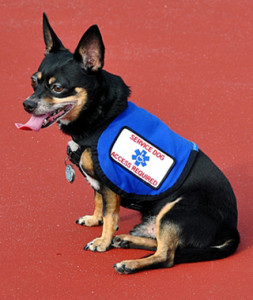 THIS PROBABLY NEVER HAPPENED TO YOU, BUT….
THIS PROBABLY NEVER HAPPENED TO YOU, BUT….
The tenant from #3 called. She said that she needed a dog. She said that she really needed a dog to help her with what she called a “panic disorder”.
We discussed this with the owner, and the owner took the request as just a “bogus” attempt to get around the House Rules which do not permit animals. The owner encouraged us to immediately issue a 3-Day Notice to Conform to Covenants. We politely declined to do so, and advised the owner of the potential risks of such a course of action.
Any attempt to remove a tenant that can possibly be linked to the tenant’s disability would be BIG MISTAKE !!!
These days we apartment owners and managers must be very careful anytime we hear the word “disorder”, as it goes way beyond what we once thought of as a disability. We all understand that in spite of House Rules against animals, we would immediately accept a “seeing-eye-dog”. But the concept of disability has been (and will likely continue to be) expanded here in California. In the situation mentioned above, if the tenant had been able to prove in court that she was, in fact, disabled, and that the owner had acted in violation of the Americans with Disabilities Act, not only would the eviction have been disallowed, but the owner could also be assessed a whopping penalty for the violation.
We’re operating our rental businesses in an ever-changing frontier. There was a time not long ago when you could tell a disability by the common signs: a wheel-chair, a cane, or seeing-eye-dog. Not anymore. But just because a tenant claims a “disorder” or “disability” does not necessarily mean that it is so. So far, it is legally permissible to make reasonable inquiry into the nature and extent of a claimed disability, where the disability would not be obvious to informed observation. For example, it is not unreasonable to request a signed statement from the tenant’s health-care provider addressing the following:
- The “qualifications” or “medical degrees” held by the person recommending the treatment.
- A clear statement that this tenant has a disability.
- The specific accommodation that the health care provider is requesting relative to this tenant’s living situation ?
And even if a tenant is “disabled”, the accommodation you make only needs to be “reasonable”, as ill-defined as that is. For example, a “disabled” tenant might be given a more convenient parking space, but it may not be “reasonable” if the tenant asks for two parking spaces in a building where there is only one space per unit. It all depends on the situation, and your good judgment.
Dear Readers: This article is the 157th in a series based on the lessons we have learned the hard way. The contents of these articles are merely opinions of the writer. They are not intended as specific legal advice and should not be relied upon for that purpose. Our practice is in constant refinement as we adjust the way we operate to an ever- changing market. I appreciate your questions, comments, suggestions, and solutions. Contact C. Finley Beven, JD, CPM, CCAM, 99 S. Lake Avenue, Pasadena. (626) 243-4145. FinBeven@msn.com
